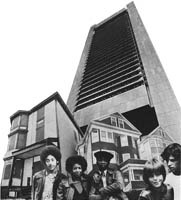
Documentary | Filmmaking | Massachusetts | Retrospective
Remembering Richard Broadman
Written by Holly Madden | Posted by: Anonymous
John Lennon sang, "In the end, the love you make is equal to the love you take." If the same philosophy applies to filmmaking, then the late documentarian Richard Broadman will leave this world with a stockpile of gritty, honest and always thought-provoking cinematic images.
One thing’s for certain: Broadman left behind a loyal following of friends and film peers who will sorely miss his uncompromising vision and "just do it" attitude. Broadman passed away in early January at the age of 53 after a brief illness.
Ted Reed, one of Broadman’s close friends and President of Counter Productions in Beverly, Mass., spoke of Broadman’s persistence. "I really admired Richard because he stuck with making documentaries long after the funding channels had dried up. It’s tougher than ever to raise money to make documentaries these days, but Richard always managed to pull it off — even if it took up to five years. He had a real talent for pulling people together. At his funeral, it was amazing to see the wide range of people he knew and brought together to make his projects happen — teachers, community activists, students, people with all sorts of talents and backgrounds."
Reed first met Broadman in the early ’70s at the Museum School. In the years that followed, they were roommates in a $70-a-month Mission Hill apartment, they went to antiwar marches in Washington, D.C., and experimented with the film medium without any specific career path in mind. Eventually he with worked Broadman on two of his acclaimed documentaries, "Mission Hill and the Miracle of Boston" and "Down the Project: The Crisis of Public Housing." In the past few years, Reed partnered with Broadman to create the Fusion Workshop at the Boston Film and Video Foundation. "The course focused on how to bring people together of different disciplines together to make a film, from artists and designers to writers and business people. We worked with the students to make a short film called ‘Evuncular,’ which Richard wanted to incorporate into a feature-length sci-fi film. To do that, all we need to do now is shoot the connecting elements."
Shortly before Broadman’s death, Reed also worked with him on "Brownsville Black & White," the story of race relations over three decades in the Brooklyn neighborhood of Brownsville. "All the shooting was completed for the film, but we still need funds to produce the titles, music track and purchase archival footage. We hope to raise the money through a memorial fund which was set up on Richard’s behalf by the Center for Independent Documentary."
The topics for Broadman’s documentaries steered away from Movie/Disease of the Week themes. He was more intrigued by topics that challenged people; that made them leave the theaters with their heads full of questions. In Reed’s opinion, "A Place for Jazz," a portrait of a local jazz club, was one of Broadman’s best documentaries and the one he was closest to. He also calls "Water and the Dream of the Engineer" an exemplary Broadman film. "Some of the personal portraits in the film are absolute jewels," Reed adds. The documentary tells the story of the crisis in the New York City public water system.
"Richard had a unique ability to make social commentary without a specific political bent," Reed says. "And that sometimes pissed people off. He was very influenced by people’s struggles, by the contests between bureaucracies and people."
When asked about Broadman’s defining trait, many of his friends provide the same answer: uncompromising. Reed explains: "Richard never did a film that was a compromise, and he tried to instill that mind-set in other people. He was great with the people he worked with, gave them constant support, reinforcement. He always told people to work through their fears of failure to find their true passion. It’s advice that changed my life."
Susi Walsh and Fred Simon of the Center for Independent Documentary agree. "An independent’s independent, Richard was fiercely committed to the issues which drove him to make his documentaries and was never willing to compromise his vision of how those films should be made. For three decades, he used his filmmaking skill and energy to shed light on the social and political issues he felt were important."
Susan Steiner, another longtime friend and senior producer at a local cable station, echoes Walsh and Simon. "Richard was so fiercely independent in his filmmaking. He didn’t have to appeal to anybody; he wasn’t into making politically correct films. His goal was to make people’s heads spin after they left the theater, not to be dogmatic or bang someone over the head."
Steiner worked with Broadman as producer and co-director on "Present Memories," which explored the mind-set of American Jews and the impact of the past 60 years on their lives and culture. She also served as associate director on "Love Stories: Women, Men & Romance," which focused on the social history of romance over the past century. "Broadman managed to capture the very different voices of men and women on love and how love has become a media phenomenon," Steiner explains. "And as with his other documentaries, he also incorporated a sense of history while telling his story and often used archival footage."
In Steiner’s opinion, "Mission Hill and the Miracle of Boston" was his most defining film. "He was willing to take risks," she explains. "He set out to tell the story the way he saw it, allowed the voices to be heard. It was a great example of honest, gritty filmmaking."
Steiner also praised his ability to get his subjects to open up on the set and feel comfortable telling their stories. "He had a great ability to listen to people; to formulate the question needed to get the answer he was looking for." Ted Reed agrees. "He was like talking to a shrink. Soft, quiet, comforting. Very low pressure, unlike a lot of other documentary filmmakers. He built up people’s confidence, making them feel at ease about what they were intimating."
In the local film community, Broadman is considered a pioneer, a visionary, and an inspiration. Yet, in the national independent scene, Broadman never become a well-known name. And according to Susan Steiner, this didn’t bother Broadman at all. "One time I asked Richard, ‘Why do you do this?’ He answered, ‘Because it’s what I do.’ The truth is Richard didn’t like acknowledgement. And overall, I don’t think he got the acknowledgement he deserved because his films were not easily ‘niched’; they weren’t about ‘easy’ or popular topics. He also wasn’t willing to surrender editorial control or alter his film to please a distributor’s tastes. Overall, the distribution route for documentaries is challenging. There’s the film festival route, which is costly and competitive. Then there’s PBS, which is also very competitive and they typically use their own staff of directors to produce documentaries. Richard’s goal was to have his films used for educational purposes, for his films be part of a course curriculum."
Now that Broadman is gone, his friends and film peers hope to keep his unrelenting vision alive and to expose the public to the fruits of his prolific filmmaking career. There is talk that Bo Smith of the Museum of Fine Arts may hold a screening of his work in the near future. In the meantime, people can make contributions the Richard Broadman Memorial Fund. The proceeds will benefit both his daughter, Ellie, and the costs of completing his final film. Checks should be made out to The Center for Independent Documentary and should be sent to The Center for Independent Documentary, 43 Myrtle Street, Norfolk, MA 02056. For more information on Broadman’s films, visit http://www.cineresearch.org/.










